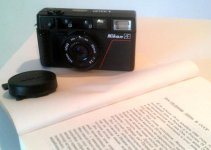My current P&S
My current P&S
 Point & Shoots
Point & Shoots by
Jeremy, on Flickr
From left to right: Olympus mju, Pentax PC35AF and Nikon L35AF3.
mju - Smallest and most modern. Excellent for its size. The lens is a triplet though, so the edges are never sharp. One doesn't notice with a casual glance, but it is true with any triplet that hasn't got any aspherical elements. Ergonomically, it is much better than a mju II "Stylus Epic". It's surprisingly comfortable to use for its size, and no real chance to block the flash with a clumsy finger. No option to delay the film winding between frames, so it's not a very stealthy camera. These never have corroded battery terminals, since the CR123 lithium battery it uses don't leak. I paid $30 for this one on Craigslist, described as "everything worked last time I used it". I took the chance, as they're currently fetching around $100.
Pentax PC35AF - Awesome 5-element 35/2.8 lens. For this size camera, it is in a class of one. Manual film advance and rewind, which I like. It is nice & quiet. AF accuracy is not as reliable as the mju's. It runs on two AAA batteries, which power AF and flash, so it's slow to charge, even with the lithium AAAs I keep in it. It has the live plastic hinge for the film door, so that'll be an eventual failure point. (another reason I feed it with lithiums) It took 3 of these for me to find one that was working properly. Most ebay sellers don't film test, so they don't really know. They don't have a great reputation for reliability, but they're still kind of under the radar. I paid $50 for this one.
Nikon "One Touch" L35AF3 - My grandpa had one of these in the late 80s. This is the 3rd generation, which has an improved film door, uses a 2CR5 lithium battery. The battery is expensive ($8 on Amazon?) but it lasts a lot of rolls, charges the flash quickly, and won't leak and corrode anything if left in the camera for a few decades. This 3rd generation has the 4 element lens instead of the 5 element lens of the 1st gen., but has a far superior battery door with a proper hinge. The lens is notably better than the triplet in the mju, about the same as the 5 element of the Pentax. It has auto-wind and rewind, but it doesn't wind on until I release the shutter button, so the noise doesn't give me away unless I'm careless. It has a handy flash cancel button and no menus. Someone gave me this out of the goodness of his heart because he wasn't using it and he knew I would.
One last thing: It has the light sensor inside the filter threads. (1st version had this, but the 2nd version didn't) It's the only one of these three that can take a filter.
Good ones of these are getting $150 on ebay now. If I could only keep one, it would be this one. Lens and build quality are excellent, and it has some features that enthusiasts appreciate. Also, it reminds me of my grandpa, which is a good thing.
(not shown)
Minolta Freedom II - These are under the radar, and the 35/4.5 lens is fantastic; as good or better than the 5-element in the Pentax. However, there's no flash cancel and no half-press to focus. It is as simple as AF gets. Just forget about having your subject off-center, and you'll be OK. I gave this one to my 8 year old daughter, as she likes the subject centered anyway. ;-)
There are some sample images from these cameras in my aptly-named Flickr albums,
here.




